As birds are born to fly, they can avoid obstacles that come their way while moving. However, sometimes they collide with windows, resulting in injuries such as bleeding from the beak after hitting the window.
If you have encountered this distressing situation, it’s crucial to understand the possible causes behind the bleeding. Birds can bleed from the beak due to beak fractures or damage to the nasal tissues.
Internal bleeding or injury in the nasal passage can also be the reason. In some cases, bleeding is caused by avian pox, respiratory infections, or blood clotting disorders.
Let’s dive in and explore the various reasons for birds bleeding from the beak after hitting a window. We will also discuss the methods to stop the bleeding and potential treatments.
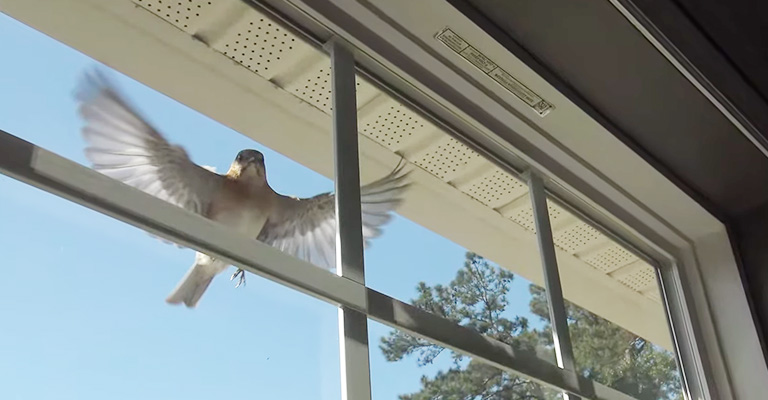
Why is My Bird Bleeding from Beak after Hitting Window? – How to Diagnose?
If your bird is bleeding from the beak after hitting a window, it’s important to seek immediate veterinary attention for a proper diagnosis and treatment.
Here are a few possibilities for the bleeding:
Beak Fracture
The impact of hitting a window can cause a fracture in the bird’s beak, leading to bleeding. Look for any visible signs of a broken beak, such as misalignment, cracks, or pieces of the beak missing.
You can ask a veterinarian to examine the bird’s beak and determine the severity of the injury.
Soft Tissue Injury
In most cases, the forceful collision can result in soft tissue damage within the bird’s beak, leading to bleeding. Observe the beak for any cuts, tears, or swelling.
Internal Bleeding
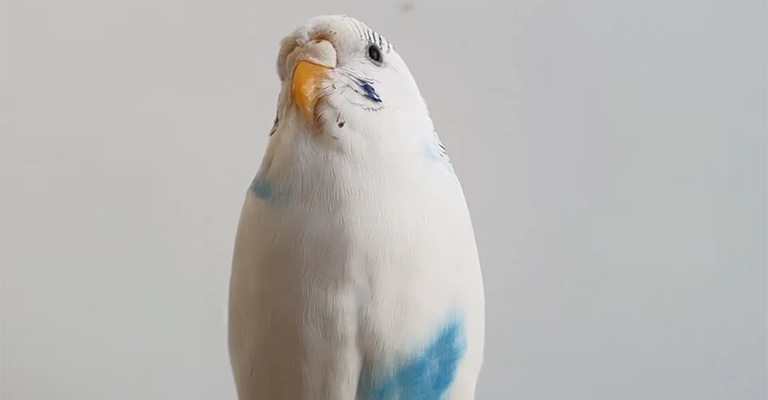
If the damage is severe, the bird may experience internal bleeding due to the impact. Look for signs of blood in the bird’s mouth, throat, or regurgitation.
Nasal Injury
Hitting a window can cause injury to the bird’s nasal passages, leading to bleeding from the beak. Check for any signs of blood around the nostrils or discharge. Again, a veterinarian will be able to assess the situation accurately.
Avian Poxvirus
Although not directly, pox virus can be the reason why your bird is bleeding from the beak. Avian pox can cause lesions or growths in the bird’s mouth or beak, which may bleed after colliding with a window. Look for any abnormal growths or sores.
Respiratory Infections
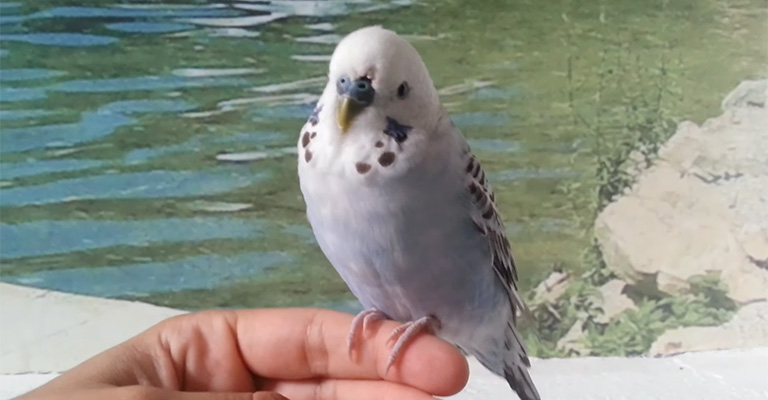
Birds with respiratory infections may have fragile blood vessels in their beaks, which can lead to bleeding after hitting a window. Observe for signs of respiratory distress, such as wheezing, coughing, or discharge from the eyes or nostrils.
Blood Clotting Disorders
Some birds may have underlying blood clotting disorders, making them more prone to bleeding after an injury. If your bird bleeds excessively or for an extended period, it may indicate a clotting issue.
Foreign Object Lodged in Beak
The collision with a window may cause a foreign object to become lodged in the bird’s beak, leading to bleeding. Carefully inspect the beak for any foreign bodies or obstructions.
8 Ways to Stop Bleeding from the Beak:
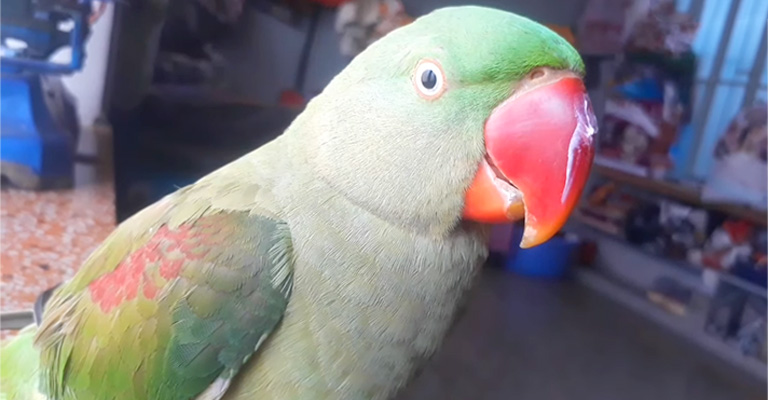
Bleeding from the beak is a serious issue in birds and it is essential to take immediate action to stop the bleeding. Here are some steps you can take:
- Remain Calm: It is crucial to stay calm and composed to provide the best care for your bird.
- Move the Bird to A Quiet and Safe Environment: Ensure that the bird is in a calm and secure place, away from other animals or potential hazards.
- Limit Stress and Handling: Minimize stress as much as possible to avoid further injury or distress to the bird. Try to handle the bird as little as necessary until you can seek professional help.
- Assess the Injury: Determine the severity of the bleeding and identify any visible wounds or fractures.
- Apply Pressure: Gently apply pressure using a clean cloth or sterile gauze pad to the bleeding area. Maintain the pressure for a few minutes until the bleeding stops.
- Cold Compress: Applying a cold compress to the beak can help constrict blood vessels and minimize bleeding. Wrap a clean cloth or ice pack in a towel and hold it against the beak for a few minutes.
- Avoid Ingestion: Prevent the bird from ingesting any blood, as it can cause further complications. Keep the bird calm and restrict access to food and water until the bleeding has stopped.
- Seek Veterinary Assistance: Even if the bleeding stops, it is crucial to consult a veterinarian for a thorough examination and appropriate treatment.
How to Treat If My Bird Is Bleeding from Beak?
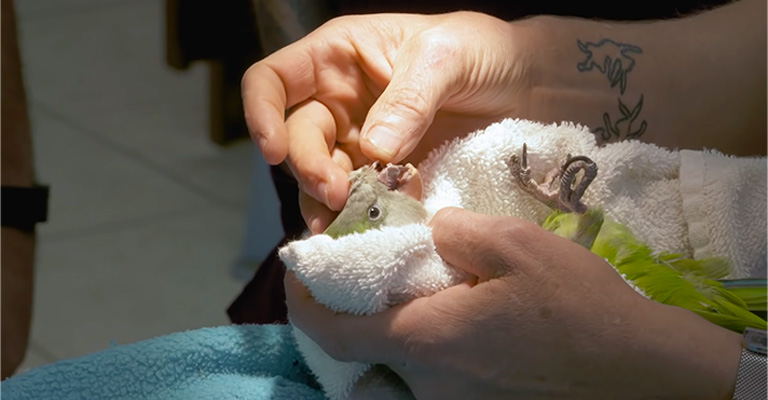
Although it’s not recommended to provide the bird with any medications or home remedies, you can try a few things in emergencies. Below are some measures you can take to help your bleeding bird-
- Antibiotics: If there are signs of infection or a risk of infection, the veterinarian may prescribe antibiotics to prevent further complications.
- Beak Realignment: In cases of beak fractures, the veterinarian may realign and stabilize the beak using dental materials or wire.
- Wound Cleaning and Dressing: The vet will clean any wounds or lacerations in the beak and apply appropriate dressings to promote healing.
- Pain Management: Medication to alleviate pain may be prescribed to ensure the bird’s comfort during the healing process.
- Fluid Therapy: In severe cases, fluid therapy may be necessary to maintain hydration and support the bird’s overall health.
- Nutritional Support: The veterinarian may recommend a specialized diet or nutritional supplements to aid in the bird’s recovery.
- Preventive Measures: To avoid further accidents, take precautions such as installing window decals, blinds, or screens to make the windows more visible to birds.
- Environmental Enrichment: Providing a stimulating and bird-friendly environment can help reduce stress and prevent birds from colliding with windows.
FAQs
While some birds may die immediately from the impact, others can suffer internal injuries that may lead to death later on. Prompt veterinary care is crucial.
Apply gentle pressure for several minutes, but if the bleeding persists or is profuse, seek veterinary assistance immediately.
Beak fractures require professional veterinary care. Attempting to treat them at home can cause further harm to the bird.
Use window decals, blinds, or screens to make windows more visible to birds. Positioning feeders and baths away from windows can also help.
With proper veterinary care and timely treatment, many birds can recover from beak injuries and resume a normal life.
Wrapping Up!
So, now you know what causes bleeding from the beak after hitting the window. Finding your bird bleeding from the beak can be a distressing experience.
By understanding the potential causes of the bleeding, taking immediate steps to stop the bleeding, and seeking professional veterinary care, you can provide the best chance for your bird’s recovery.
Always remember to take preventive measures to avoid future collisions and create a safe environment for your feathered companion.